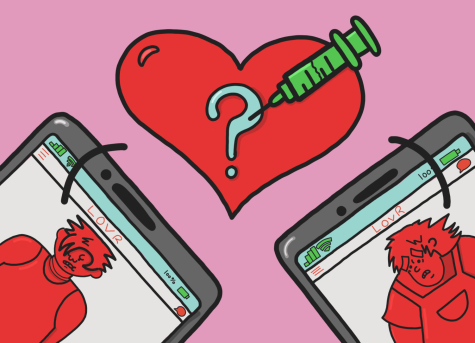Swiping in the city: Columbia students weigh in on dating apps during the pandemic
February 9, 2022

As Generation Z college students battle social anxiety, isolation and fear of contracting the COVID-19 virus, meeting new people has become everything but the college experience our parents still reminisce about. Because of this, many have resorted to swiping left and right to meet partners, casual hookups or new friends online.
Kenzie Iszard, a sophomore acting major, said boredom during quarantine led her to download Tinder and Bumble. If her potential date was unvaccinated, Iszard considered that to be a dealbreaker, and before she met anyone in person, she asked if they had tested positive for COVID-19 or had recent exposure to the virus.
Since the pandemic hit in March 2020, most dating apps have added new profile features, such as the ability to display vaccination status and the option to filter users’ feeds according to their COVID-19 comfortability.
“It’s hard to know if people are as [COVID-19] safe as you on dating apps or are vaccinated,” said Emily Ferneau, a junior fashion merchandising major. “I know that a lot of [apps] ask on the profile, but not everyone’s honest and not everyone even adds them to their profile.”
Ferneau said if she felt like she was going to kiss someone she met on a dating app, she would first ask for their proof of vaccination because some of her family members are high-risk individuals.
Despite COVID-19, more people than ever have been using dating apps. According to Tinder’s annual user statistics, the app earned more annual revenue and had more subscribers than ever before in 2021, jumping from 9.1 million subscribers in the first quarter of 2021 to 10.6 million at the end of the year. In the U.S., people ages 18-24 represent the highest percentage of the app’s users at 35%.
“[Dating] has kind of shifted to being a little more comfortable with people online because you’re able to talk to them and get to know them more, and [you’re] able to set up a boundary that you may not be able to do when you meet people in person,” Iszard said.
Taylore Mountain is an associate marriage and family therapist at the Chicago Center for Relationship Counseling, 5100 N. Ravenswood Ave. She works with clients from college age and above, some of whom use online dating.
Mountain said the pandemic helped many people better learn their wants and needs in a relationship, making dating apps a more intentional way of dating.
“There are apps for really anybody in any kind of situation that they want, and there’s a lot of freedom to express what you are looking for in a relationship or friendship, whatever it may be,” Mountain said.
Mountain is a dating app user herself, using Hinge, Match, Plenty of Fish, Her and eHarmony over the span of 10 years, and she has dated several people she met online. She said her personal dating experience inspired her to create an Instagram and a coaching website to help codependent people realize their potential.
When working with a client in the online dating process, Mountain said it is important to identify their top wants and needs and curate their feed accordingly with the app filters, like age, sexuality, height and vaccination status.
Alex Murphy, a junior film major, said as a queer person, they prefer meeting people online.
“I always feel safer meeting somebody online when they have their presence being promoted as a queer person,” Murphy said.
Zanida Corujo, a sophomore music major, also prefers meeting people online first to avoid getting “mask-fished,” a new term coined during COVID-19 that refers to being catfished by someone wearing a face mask.
The students interviewed for this story agreed that the pandemic has made them place more reliance on dating apps to make connections, including Sage Brahmstedt, a junior film major.
But Brahmstedt said online dating feels “detached from reality” compared to meeting people in real life.
“Literally, it’s just like when you play a game,” Brahmstedt said. “You’re literally just swiping left and right kind of like if you’re playing Marble Blast on the computer. Like, oh, ‘Let’s see if they like me back, and I get a match.’ Ding ding ding. You win.”
And some students do find what they are looking for — whatever that may be. Reyna Zuno, a senior communication major, met her current boyfriend on Tinder, and Breslin Webb, a first-year dance major, met his ex-boyfriend, also a Columbia student, on Tinder.
Even Carrie Bradshaw found a connection on dating apps after the death of her husband in the new “Sex and the City” reboot, “And Just Like That.” Fans, however, pointed out the unrealistic nature of finding the seemingly perfect match after just three swipes, according to Cosmopolitan.
Corujo said while the convenience of dating apps have made it harder for her to meet people in real life, she gained personal empowerment and self-confidence through online dating during COVID-19.
“I personally grew up in a small town in Wisconsin. As a woman of color, as a plus-size woman of color, I did not fit in with the people around me. … No one really was really interested in the POC,” Corujo said. “But, the apps made me feel more confident knowing that there was someone that found me attractive.”







